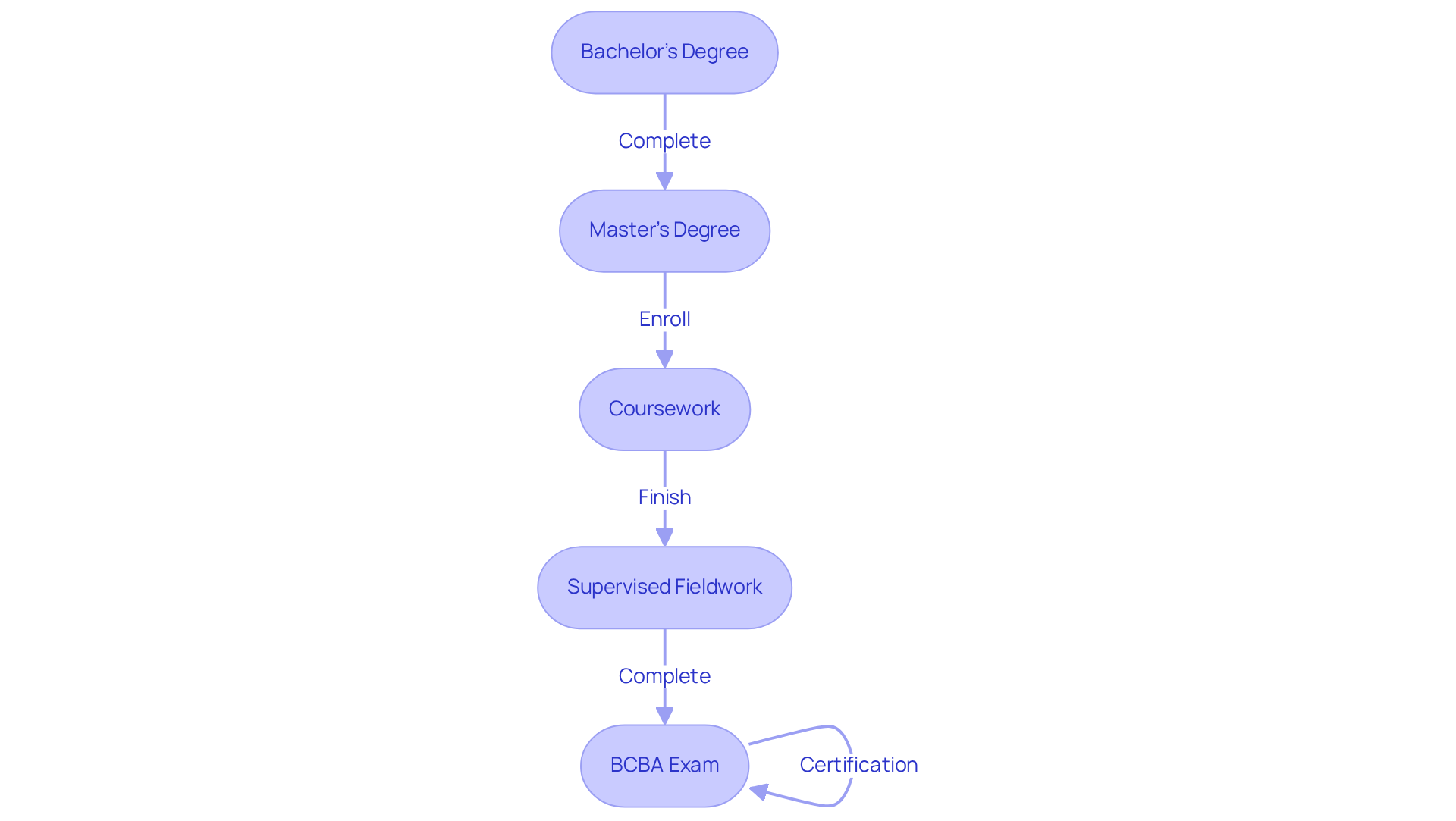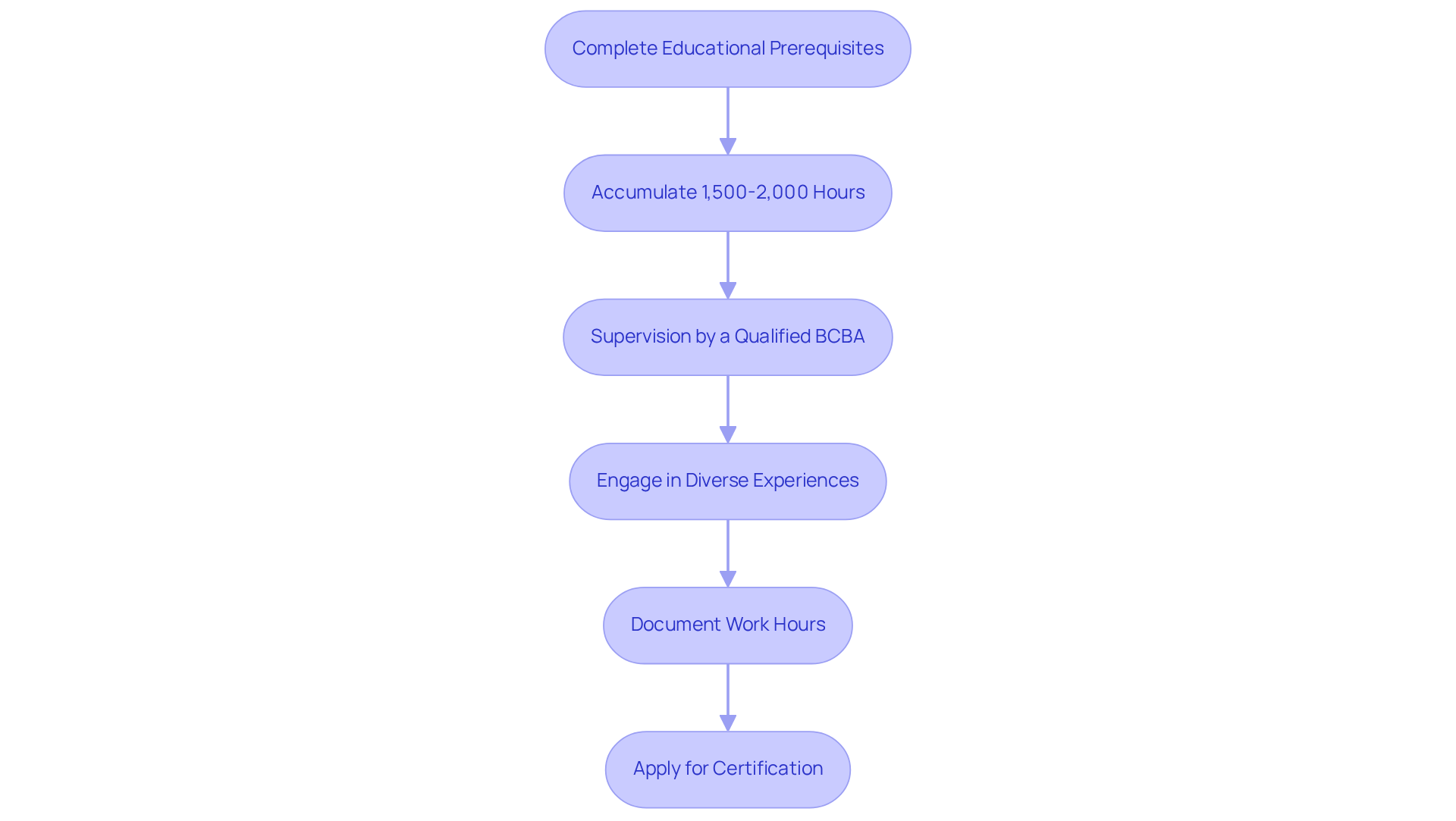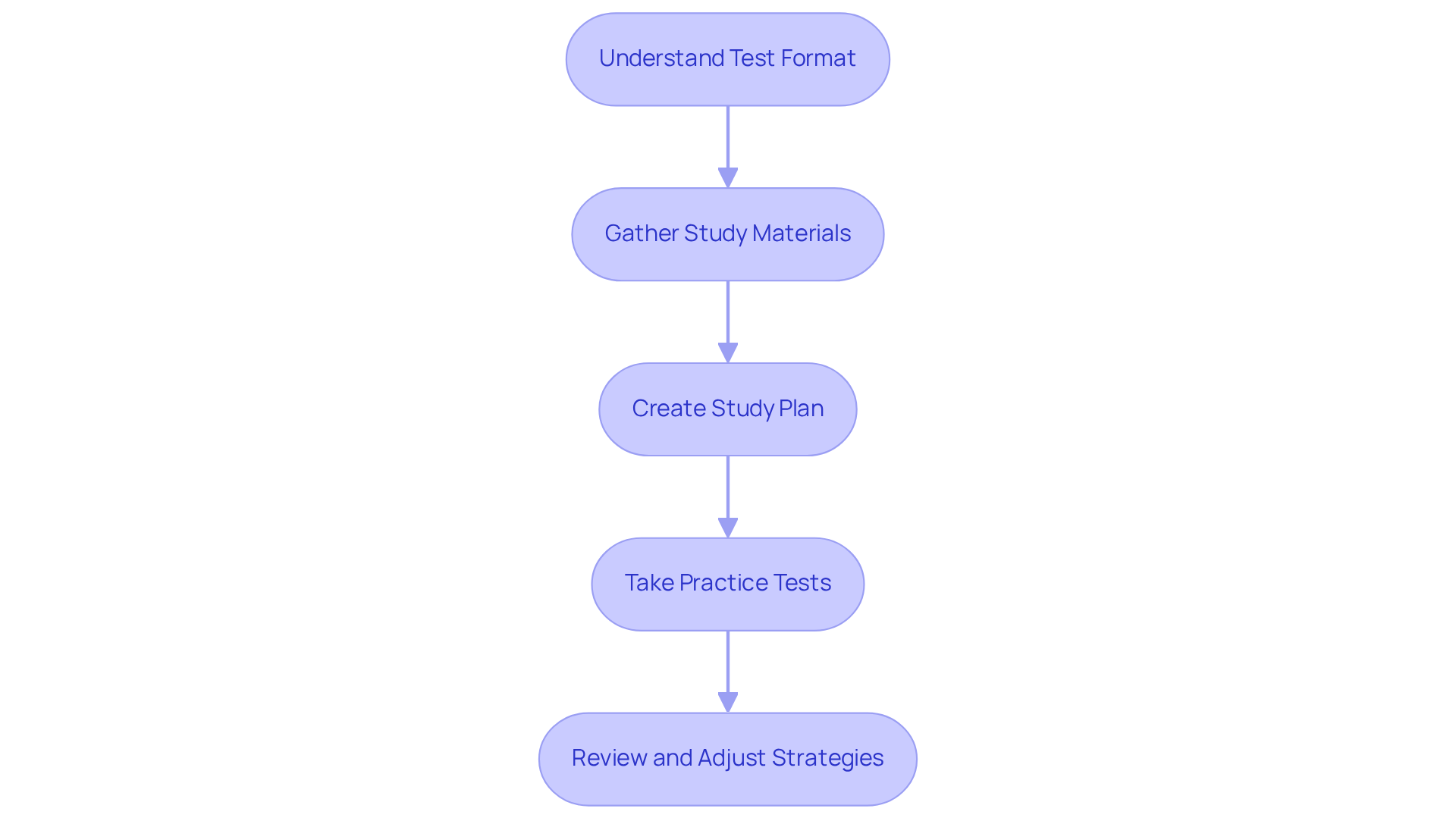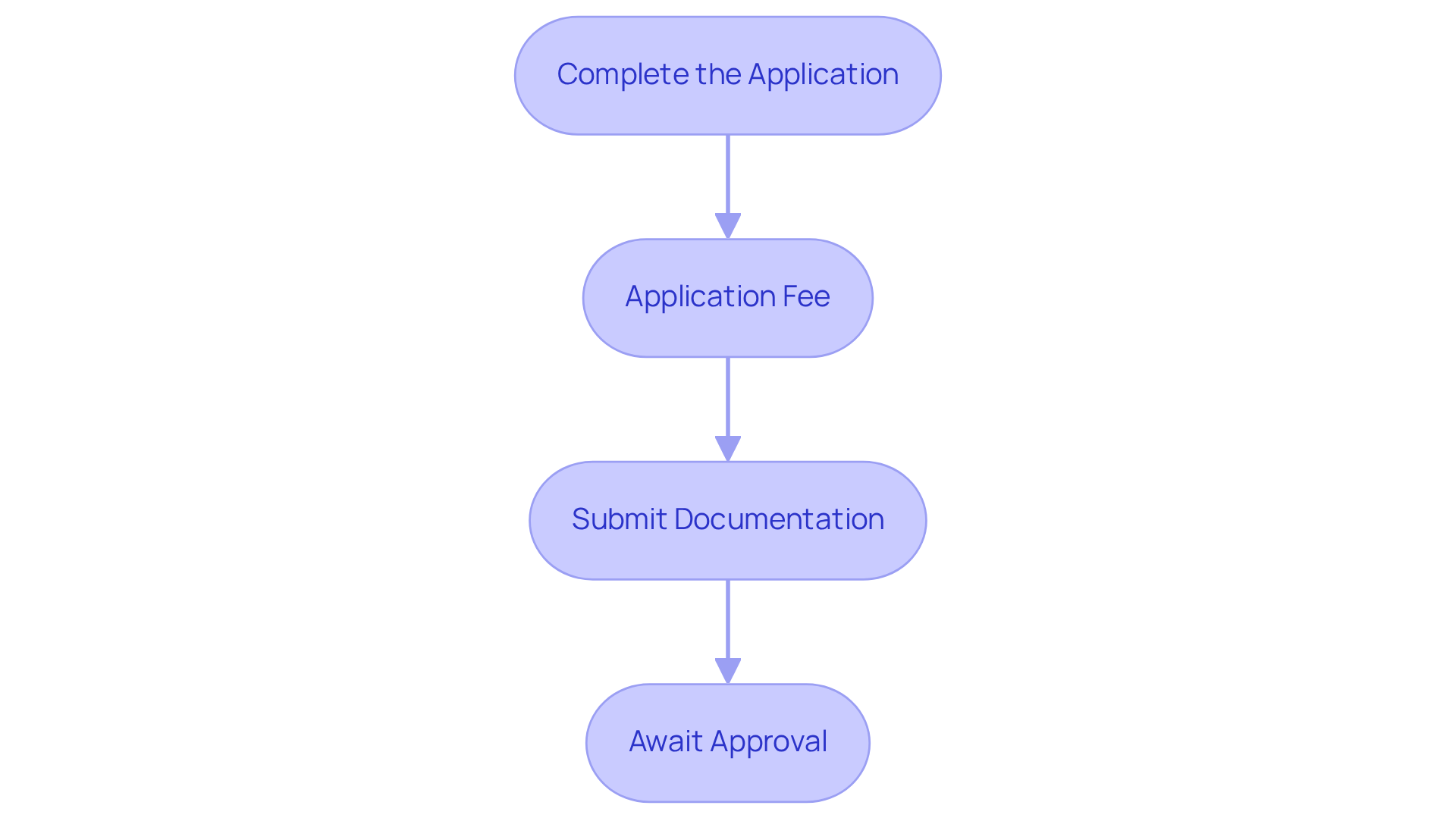June 25, 2025

In today's rapidly evolving healthcare landscape, the demand for Board Certified Behavior Analysts (BCBAs) is surging. To become a BCBA, individuals must navigate a structured series of educational and practical steps. This includes:
The entire process can span from 12 months to several years, contingent upon individual circumstances and the pace at which each requirement is fulfilled. This underscores the critical importance of meticulous preparation and documentation throughout the journey.
Are you facing challenges in hiring qualified BCBAs? Consider how Hire ABA can streamline your recruitment process, ensuring you connect with the right talent efficiently. With a reliable platform at your disposal, you can navigate the complexities of hiring with confidence.
The path to becoming a Board Certified Behavior Analyst (BCBA) is both rewarding and rigorous, reflecting the increasing demand for professionals in this essential field. As the need for BCBAs continues to rise, aspiring candidates must navigate a structured journey that encompasses:
Each step builds upon the last. Yet, with the timeline for achieving certification often varying significantly among candidates, one pressing question remains: how long does it truly take to become a BCBA? Moreover, what strategies can enhance the likelihood of success? As you consider your hiring challenges, think about how Hire ABA can support your recruitment needs in this competitive landscape.
To become a Board Certified Behavior Analyst (BCBA), it's important to consider how long it takes to become a BCBA and establish a solid educational foundation. The demand for BCBAs is rising, making this a pivotal career choice. Start by obtaining a relevant educational background, which typically includes the following steps:
As you consider your path to becoming a BCBA, reflect on your current hiring challenges. How can you leverage your qualifications to stand out in this competitive field? The right educational background not only enhances your expertise but also positions you for success in a growing market.

After meeting your educational prerequisites, the next essential step is to acquire practical experience through supervised practice. Here’s how to effectively approach this process:
Fieldwork Time: Accumulate between 1,500 to 2,000 hours of supervised practical experience, which must be completed within a maximum of five years. Candidates frequently discover that how long does it take to become a BCBA can range from 12 months to multiple years, depending on their personal situations and availability. Notably, candidates could fulfill their requirements in as little as 11.5 months, prompting the inquiry of how long does it take to become a BCBA if they reach a total of 1,500 hours.
Supervision: Your fieldwork must be overseen by a qualified BCBA. At least 50% of your time should involve direct oversight, where you receive constructive feedback and guidance on your practice. Supervisors must have no current disciplinary sanctions and complete an 8-hour supervision course. Monthly oversight is essential; without it, time cannot be recorded for that month. Candidates are encouraged to maintain at least two face-to-face supervision contacts each month, with one-on-one meetings being essential for effective mentorship.
Diverse Experiences: Engaging in a variety of settings—such as schools, clinics, and community organizations—is vital for developing a well-rounded skill set. Varied practical experiences not only improve your comprehension of different client requirements but also equip you for the complex aspects of ABA therapy. For instance, working in a school environment may provide insights into educational strategies, while clinical settings can deepen your understanding of therapeutic interventions.
Documentation: Meticulously record your work hours and the activities carried out. This documentation is crucial when applying for certification and should include details of your supervision and the specific tasks undertaken. Keeping accurate records for at least seven years is advisable, as both supervisors and supervisees should retain copies of all documentation.
By adhering to these guidelines, behavior analyst candidates can efficiently manage the practical experience requirements, ensuring they are well-equipped for certification and future positions in the area of Applied Behavior Analysis.

Once you have fulfilled your educational and fieldwork requirements, the next step is to pass the certification examination. To prepare effectively, consider the following strategies:
Successful BCBAs emphasize that efficient test preparation is vital for achievement. Mike Sandy, a Board Certified Behavior Analyst, notes the importance of focusing equally on all areas during study. Moreover, utilizing study groups has proven to improve success rates among candidates, as collaborative learning fosters a deeper understanding of complex concepts. With the right preparation techniques, candidates can enhance their chances of success in the certification test and advance their careers in behavior analysis. Additionally, consider resources like the BOOST 6th Edition BETA Mock Exam to further strengthen your preparation efforts.

After passing the behavior analyst examination, you can confidently apply for certification and licensure, but many wonder how long does it take to become a BCBA. Follow these essential steps to ensure a smooth process:
Taking these steps is crucial for establishing your credentials in the field. Are you ready to advance your career and meet the growing demand for qualified BCBAs?

Becoming a Board Certified Behavior Analyst (BCBA) is not just a career choice; it is a structured journey that demands dedication to education, practical experience, and certification. With the increasing demand for qualified behavior analysts, now is the time to take action. This process encompasses several essential steps:
Each stage builds upon the last, creating a comprehensive pathway toward a rewarding career in behavior analysis.
Throughout this guide, we have emphasized the importance of a solid educational foundation and hands-on experience. Candidates must complete accredited coursework, engage in supervised fieldwork, and prepare rigorously for the certification exam. Are you ready to navigate this process effectively? By understanding the requirements and taking proactive steps, aspiring BCBAs can position themselves for success in a field that is increasingly in demand.
The journey to becoming a BCBA not only enhances professional qualifications but also significantly contributes to the well-being of individuals and communities served. As the demand for qualified behavior analysts continues to grow, committing to the necessary steps and remaining focused on the goal will enable future BCBAs to make a meaningful impact in the lives of those they assist. This is your opportunity to pave the way for a brighter future in Applied Behavior Analysis.
What is the first step to becoming a Board Certified Behavior Analyst (BCBA)?
The first step is to secure a bachelor's degree in psychology, education, or a related field, which typically requires four years of study.
What type of degree is required after obtaining a bachelor's degree?
After obtaining a bachelor's degree, you need to enroll in a master's program in Applied Behavior Analysis (ABA) or a related field. This program usually takes two to four years, depending on whether you attend full-time or part-time.
Why is it important for the master's program to be accredited?
It is important for the master's program to be accredited by the Association for Behavior Analysis International (ABAI) to ensure that it meets professional standards required for BCBA certification.
What specific coursework is necessary for BCBA certification?
Necessary coursework includes topics such as behavior assessment, intervention strategies, and ethics in behavior analysis, which align with the requirements set by the Behavior Analyst Certification Board (BACB).
How does having the right educational background benefit aspiring BCBAs?
Having the right educational background enhances expertise and positions candidates for success in a competitive and growing market for BCBAs.
Our expert recruitment strategies and AI-driven sourcing ensure that you receive top-notch candidates quickly, without compromising on quality. Whether you’re looking for BCBAs, Clinical Directors, or RBTs, we’ve got you covered.